Gov. Kay Ivey visits Atmore on her statewide broadband tour

On Wednesday, Alabama Governor Kay Ivey (R) visited Atmore Community Hospital in Escambia County on the third stop on her broadband tour. Ivey stressed the importance of high-speed internet in allowing Alabamians to access telehealth services while highlighting the progress in broadband projects across the state. “Broadband availability is not just for our convenience – it is a lifeline, particularly evident in telehealth services,” said Gov. Ivey. “For thousands of Alabamians in rural areas, telehealth bridges the gap to medical facilities, and without broadband, this vital resource remains out of reach for many,” said Governor Ivey. “I am proud to say Alabama remains committed to expanding our digital infrastructure, aiming to connect households, businesses, and institutions. Our broadband journey continues until every Alabamian has the ability to access high-speed internet.” Gov. Ivey was joined by Alabama Department of Economic and Community Affairs (ADECA) Director Kenneth Boswell, State Sen. Greg Albritton (R-Atmore), and Rep. Alan Baker (R-Brewton). “When you look at the digital world we live in today, access to broadband infrastructure is just as important, in many ways, as having access to electricity or running water,” said Sen. Albritton. “But for many Alabamians, especially those living in tougher to access, rural areas of our state, getting connected to high-speed internet is difficult and expensive. That’s why the programs we have funded through the legislature are so important; they give internet service providers the support needed to connect these hard-to-reach areas so that no Alabamians are left out. I have been proud to support broadband expansion in my leadership role in the Alabama Senate, and I will continue my work on this issue until all Alabamians have access to the 21st-century technologies needed for everyday life.” Albritton is a 2024 candidate for Congress in Alabama’s Second Congressional District. Eight candidates in total are running in the March 5 Republican primary, and 13 Democrats are running in the CD2 Democratic primary. Escambia and Baldwin Counties are receiving more than $17 million in grant and matching funds committed for broadband projects. These projects will give more than 3,600 currently unserved addresses the ability to be connected to broadband. These projects will result in over 140 miles of new fiber. The overall success of the Alabama Broadband Accessibility Fund (ABAF) was also discussed. ABAF is funded by the Alabama Legislature and supports targeted projects in communities in need of high-speed internet access. These funds are awarded by Governor Ivey and managed by ADECA. The grant awards give internet service providers the ability to execute projects that connect individual households, businesses, community anchor institutions such as libraries and schools, and others to broadband infrastructure. “Our continued progress in expanding high-speed internet access would not be possible without a unified team working hard every day to accomplish our state’s broadband goals,” said Director Boswell. “This team includes Governor Ivey, the Alabama Legislature, internet service providers, and others too many to name working together to make sure Alabama residents and Alabama communities have the tools needed to thrive.” Since 2018, Alabama has invested approximately $82 million in state dollars through grant awards supporting more than 100 projects through the Alabama Broadband Accessibility Fund. Once all Alabama Broadband Accessibility Fund projects awarded to date have been completed, access to broadband service will be available to more than 72,000 Alabama households, businesses, and community institutions that currently have no option to subscribe. The federal government has invested hundreds of millions of dollars into expanding broadband services in Alabama through the American Rescue Plan Act and the Build Back Better Infrastructure Bill. To connect with the author of this story or to comment, email brandonmreporter@gmail.com.
Report recommends changes to Alabama’s education system
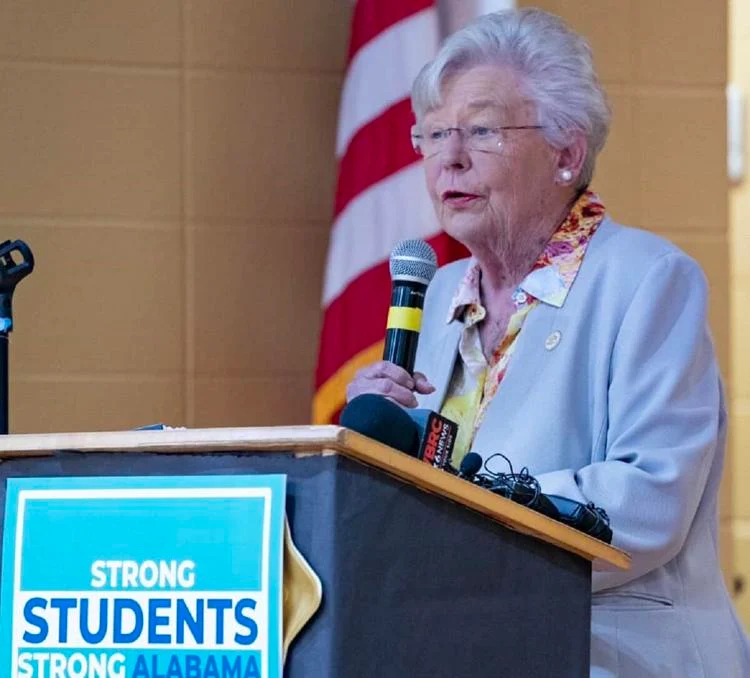
Recommendations have been made to improve education at the student and educator levels in Alabama by the Governor’s Commission on Teaching and Learning. The state should promote quality teaching and learning, offer more support for both impoverished and low-performing schools, bolster data collection and accountability, and improve the retention and development of educators, the report says. “These recommendations won’t just serve as mere guidelines; they are a blueprint – a roadmap to our goal of positioning Alabama among the top 30 states on the National Assessment of Educational Progress, or NAEP, which is known as the nation’s report card,” Gov. Kay Ivey said in a release. “They are vital guidelines as we navigate toward a brighter future for our children – one where opportunities flourish and aspirations are nurtured.” The commission recommended full implementation of the Alabama Literacy Act passed in 2019, which requires third graders to read on grade level before being advanced to fourth grade. It also recommended that kindergarten be mandatory, an expansion of the number of assistant principals at schools, and more computer science programs. The commission said in the report that the state’s prekindergarten program should be expanded to help poorer school districts. It also recommended creating a financial incentive program for struggling school districts to reduce chronic absenteeism. Another key item from the commission was the expansion of the state’s Turnaround Schools program, which pours personnel and money into struggling school districts to help them improve scores. The commission said the state Board of Education should change the state’s report card for districts and individual schools to expand transparency and ensure that every graduating high school student is considered college and career ready measured by an examination. The commission consisted of: • Business Education Alliance President and former State Superintendent of Education Joe Morton. • State Superintendent Eric Mackey. • State Sen. Donnie Chesteen, R-Geneva. • State Rep. Alan Baker, R-Brewton. • State Rep. Barbara Drummond, D-Mobile • Montgomery City Schools Superintendent Melvin Brown. • Wetumpka High School Principal Kyle Futral. • Mountain Brook Schools Superintendent Dicky Barlow. • Booker T. Washington teacher Reggie White. • Alabama Parent Teacher Association President Donna McCurry. • Alabaster City Schools School board member Derek Henderson. • Retired Mississippi State Superintendent Carey Wright. • Whiteboard Advisors CEO, and co-founder, Ben Wallerstein. Republished with the permission of The Center Square.
House Committee advances legislation providing stipends to principals who receive additional training
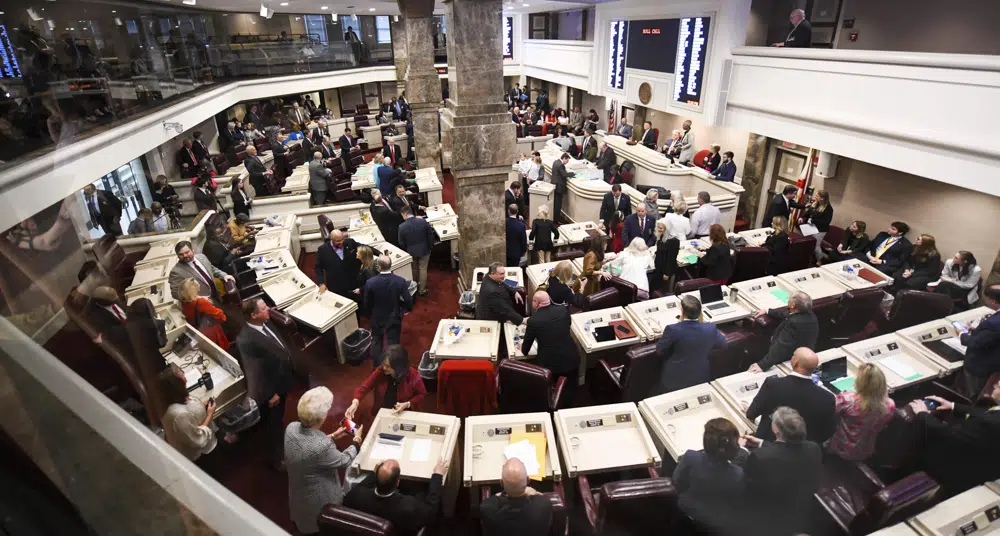
On Wednesday, the Alabama House of Representatives Ways and Means General Fund Committee advanced legislation that would provide up to $15,000 in additional stipends for principals who complete advanced leadership training. Senate Bill 300 (SB300) is sponsored by State Senator Arthur Orr. “This bill will be important for principals, compensating them and increasing the training for principals,” Orr explained. “There are extra stipends for hard-to-fill schools,” Orr said. “The principals are very much for it around the state.” The Senate adopted a substitute version of the bill. The substituted version of SB300 passed the Senate on Tuesday by a vote of 34 to 0. The legislation is being carried in the House by State Representative Alan Baker. Baker said this bill “creates the School Principal Leadership and Mentoring Act.” The synopsis states, “Existing law requires principals and assistant principals to complete five professional learning units every five years specific to serving in those administrative positions beyond the initial instructional leadership certification provided by state institutions of higher education. This bill would create the School Principal Leadership and Mentoring Act. This bill would require the creation and implementation of the Alabama Principal Leadership Development System and would require all principals and assistant principals to attend and satisfactorily complete the program.” Baker said that the bill provides a $10,000 stipend for principals that complete the program plus $5000 for those “serving in low-performing or high-poverty schools.” Rep Terri Collins said, “One of the biggest issues we have is discipline. I think this could really make a difference in student performance.” “I am pleased with all of the things I see in this,” Collins said. Rep. Debbie Wood asked, “Where did the $850,000 appropriation come from?” Baker said, “This rolls out in phases.” A clerk answered, “That is based on the figure that is in the ETF budget.” Committee Chairman Danny Garrett said, “Principals are so key and critical in good schools.” Garrett said, “My son, who is a teacher, told me, ‘I think anyone who is a principal for five years needs to go back to a classroom, and everyone who wants to be a principal needs to shadow a principal first.’” Baker said, “Professional development at the K-3 level would show them (principals) what proper teaching is in regard to the Literacy Act and the Numeracy Act.” The bill also appoints a 21-member design team and states a professional leadership academy. The legislation could be considered by the full House as early as Thursday. Thursday will be day 22 of the 2023 Alabama Regular Legislative Session. The legislature is limited to thirty legislative days in the regular session. To connect with the author of this story or to comment, email brandonmreporter@gmail.com.
Kay Ivey signs four executive orders to address education crisis
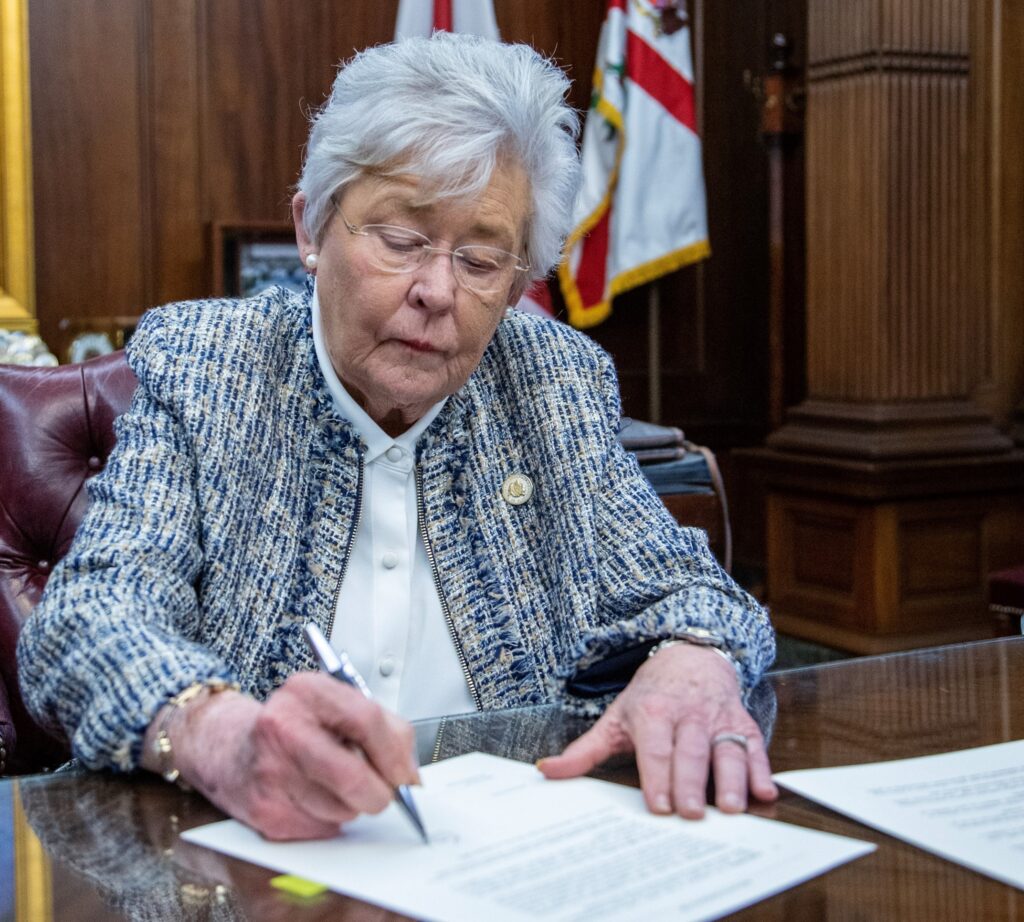
On Wednesday, Governor Kay Ivey released four new executive orders related to public education. The executive orders are intended to achieve Gov. Ivey’s inauguration day vow to get Alabama’s public school performance among the top 30 in the country. “I am proud to sign these executive orders into effect and believe they will lay an essential foundation for ensuring every Alabama student receives a high-quality education,” said Governor Ivey. “This is the first of many steps I plan to take in this new term to increase Alabama’s national ranking in our student’s reading and math performance. Our children are our future, and by investing in their education, we are investing in a better Alabama.” Alabama has poor-performing public schools. Far too many of Alabama’s public school students can’t do grade-level math, and far too many of Alabama’s children don’t read at grade level. The state has shown some recent improvement in state rankings, but this largely had more to do with other states’ performance dropping – due to extended COVID-19 school closures; than it has with more Alabama children mastering their studies. Executive Order 729 is intended to promote early literacy by establishing a statewide network with books from Dolly Parton’s Imagination Library. Ivey has authorized $4.1 million for the roll-out of the program. As promised in her inauguration speech, every Alabama child will begin receiving age-appropriate books by mail each month from birth until the age of five. Parents may opt their child out at any time. Executive Order No. 730 establishes the Governor’s Commission on Teaching and Learning. The commission will examine ways to enhance the quality of elementary and secondary education in Alabama and will produce a report of recommendations by December 1, 2023. The Members of the commission include: · Business Education Alliance President and former State Superintendent of Education Dr. Joe Morton (Chair) · State Superintendent of Education Dr. Eric Mackey · State Sen. Donnie Chesteen (R-Dothan) · Rep. Alan Baker (R-HD66) · Rep. Barbara Drummond (D-Mobile) · Montgomery City Schools Superintendent Dr. Melvin Brown · Holtville High School Principal Kyle Futral · Mountain Brook Schools Superintendent Dr. Dicky Barlow · Booker T. Washington K-8 Teacher Reggie White · Alabama Parent Teacher Association President Donna McCurry · Alabaster City Schools Schoolboard Member Derek Henderson · Retired Mississippi State Superintendent Dr. Carey Wright · Co-founder and CEO of Whiteboard Advisors Ben Wallerstein Executive Order No. 731 directs the State Superintendent of Education to submit a report outlining past progress made to date as well as future action items to expeditiously ensure the implementation of the Literacy Act (2019), the Numeracy Act (2022), the Computer Science for Alabama Act (2019), a civics-test requirement (2017), and a requirement of the State Board of Education that every high school graduate obtain a college and career readiness indicator (2022). The reports are due June 30, 2023. Executive Order No. 732 established a K-12 teacher registered apprenticeship pilot program to increase pathways to the teaching profession. This pilot program will provide an additional pathway—initially, in areas with documented teacher shortages—for qualifying paraprofessionals and teacher’s aides to obtain a Class A or Class B teaching certificate by demonstrating competency in the classroom. The pilot program will be administered by the Alabama Office of Apprenticeship within the Department of Commerce. Gov. Ivey also sent a memo to Secretary of Early Childhood Education Dr. Barbara Cooper that directs the department to prioritize creating new First-Class Pre-K classrooms in counties where more than 20% of the population falls below federal poverty guidelines. Ivey hopes that increased access to Alabama’s nation-leading program will assist the state in reaching its education-based goals. Ivey signed three executive orders on Tuesday intended to improve government transparency and accountability. To connect with the author of this story, or to comment, email brandonmreporter@gmail.com.
Nathaniel Ledbetter announces fourth and final round of committee chair appointments
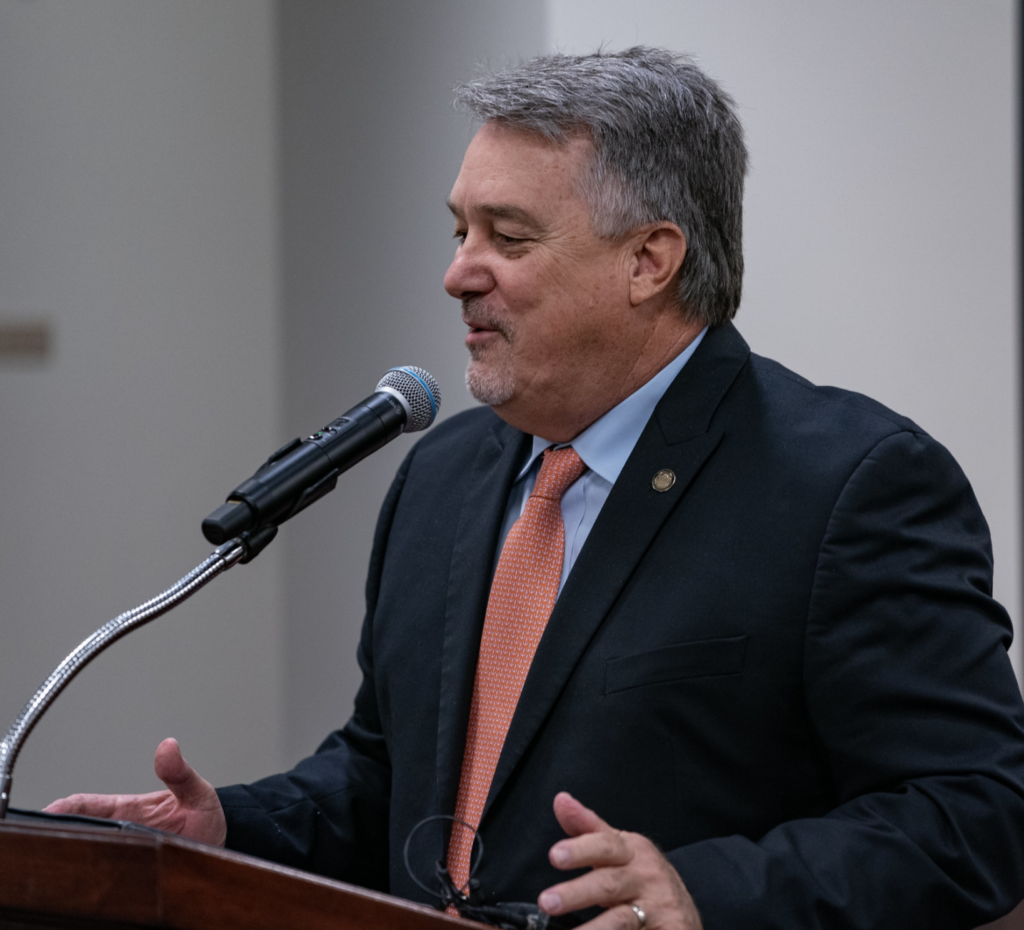
On Wednesday, State Rep. Nathaniel Ledbetter, the House Republican Caucus nominee for Speaker of the Alabama House, announced the final seven representatives he plans to appoint as committee chairs if elected as the next Speaker. “These committee chairs will handle some of the most important issues that affect the daily lives of Alabamians – health, public education, election integrity, veterans affairs, accountability to taxpayers, and local measures,” Ledbetter said in a statement. “And because the ability to easily transport goods plays such a vital role in Alabama’s economic development efforts, the new House committee on ports and waterways will be especially important in keeping our state growing.” Ledbetter created the new House Ports, Waterways, and Intermodal Transit Committee. State Rep. Chip Brown will be the inaugural chair of this new committee. Brown was elected to the Alabama House in 2018. He previously held a seat on the agenda-setting Rules Committee and served on the body’s Economic Development and Tourism, Urban and Rural Development, Insurance, and Mobile County Legislation committees. Brown is a commercial realtor and entrepreneur and served in the Alabama Army National Guard. He was deployed with the U.S. Army at the Central Command Forward Operations Headquarters in Southwest Asia during Operation Iraqi Freedom. He was also twice deployed as a military advisor in Afghanistan. Ledbetter said he created the new House committee because Alabama possesses more than ten percent of our nation’s freshwater. When combined with the expansion of the State Docks in Mobile, the Tennessee/Tombigbee Waterway, the ports of Huntsville and Birmingham, and the port being constructed in Montgomery, that transportation hub can be leveraged into one of the state’s strongest economic assets. State Rep. Phillip Pettus will remain as the House Fiscal Responsibility Committee Chair. Pettus also held seats on the Judiciary Committee, the Military and Veterans Affairs Committee, and the Public Safety and Homeland Security Committee in the previous quadrennium. Pettus is a retired Alabama State Trooper Captain. Following 25 years of service, he retired from the Alabama Department of Public Safety in 2013. State Rep. Bob Fincher will return as the House Constitution, Campaigns, and Elections Committee chair. Fincher was elected to the Alabama House in 2014. He previously held seats on the House Education Policy, Agriculture and Policy, and Local Legislation Committees. Fincher is a retired educator who taught at Woodland High School and New Hope Christian School and twice served as one of Alabama’s presidential electors. State Rep. Ed Oliver will chair the House Military and Veterans Affairs Committee. Oliver joined the Alabama House in 2018 and previously held seats on the Agriculture and Forestry Committee, the Fiscal Responsibility Committee, and the Health Committee. The former Chair of the Military and Veterans Affairs Committee –Rep. Dickie Drake was defeated in the May Republican primary. Oliver is a graduate of the U.S. Army Command and General Staff College. He served as a military helicopter pilot and inspector general and devoted 31 total years to active duty, reserve, and National Guard service. He was employed for 15 years as a civilian helicopter air ambulance pilot. State Rep. Alan Baker will return as the chair of the House Local Legislation Committee. During the prior quadrennium, Baker also served as vice chair of the House Education Policy and the agenda-setting House Rules Committee. Before his election to the Alabama House in 2006, Baker worked for 27 years as an educator and football coach in Alabama public schools. While coaching at T.R. Miller High School, he won five state championships in football and five in track. State Rep. Terri Collins will return as chair of the House Education Policy Committee. Collins sponsored and passed the landmark Alabama Literacy Act in 2019. Throughout the prior quadrennium, she held a seat on the House Ways and Means Education Committee and chaired the Alabama School Safety and Student Security Task Force. Elected to the House in 2010, Collins is a retired marketing executive and businesswoman who enjoyed a 16-year career in the banking industry in Decatur. Retaining Collins is by far the most controversial committee chair choice by presumed Speaker Ledbetter, as Collins has often incurred the anger of social conservatives for her defense of the controversial Alabama College and Career Ready Standards – which many on the ultra-right feel are too tightly aligned with the Barack Obama era Common Core educational standards. State Rep. Paul Lee will return as the chair of the House Health Committee. He has served as a member of the committee since first winning election to the Alabama House in 2010. Lee is a former Dothan city commissioner. He retired from Sony’s Magnetic Tape Division as a senior production specialist following 31 years of service. He is currently the executive director of Wiregrass Rehabilitation Center in Dothan. It is highly likely that Ledbetter will be elected as the Speaker of the House during the organizational session in January, as he is the choice of the House Republican Caucus, which holds a 77 to 28 supermajority in the Alabama House of Representatives. Ledbetter defeated State Rep. Steve Clouse for the open Speaker position in a vote by the Caucus during a November meeting. Ledbetter is the former mayor of Rainsville. He follows Rep. Mac McCutcheon as Speaker. McCutcheon chose not to run for the legislature again. If elected, Ledbetter will be the third Republican Speaker of the House since the GOP’s takeover of the state Legislature in the historic red wave election of 2010 following 135 years of uninterrupted Alabama Democratic Party legislature control. Ledbetter is part of a new generation of Republican lawmakers who have never experienced being in the minority. To connect with the author of this story, or to comment, email brandonmreporter@gmail.com.
Steve Flowers: Jo Bonner inaugurated as president of University of South Alabama

Jo Bonner was officially sworn in as the fourth president of the University of South Alabama on September 23, 2022. The University of South Alabama is the crown jewel and flagship of the Alabama Gulf Coast. It is a sprawling, manicured, beautiful, and functional modern campus. It is currently the third-largest university in the state. Under the leadership of President Jo Bonner, it will grow and prosper to where within the next decade, it will be thought of as one of our premier “Big Three” major flagship universities along with the University of Alabama and Auburn University. Its location as the only major university in the populous metropolitan Mobile/Baldwin growth area of our state, coupled with having the University of South Alabama Medical School and Center on the campus, portends for exponential growth and prosperity for the University of South Alabama. The prosperity of USA is assured by the selection of Josiah R. Bonner, Jr. as President. Over the next decade, he will be thought of in the same terms and same breath as the legendary founding President of USA, Frederick Whiddon, who oversaw the first 35 years of USA. There has never been a more perfect selection to be the leader of a major university in our state than the appointment of Jo Bonner as President of USA. His knowledge of the business, civic, and social community of the Mobile/Baldwin area is unique. Through his decade of service as their congressman, he is an integral part of the Mobile community. He left Congress with the highest regard and admiration. He was so well respected by his congressional colleagues that he was Chairman of the U.S. House Ethics Committee. You can be assured that there is no university president, lobbyist, or board of trustee member who can walk the halls of Congress and bring home the bacon from the limitless federal trough than Josiah Bonner, Jr. You can also rest assured that there is no university president in the state that has the clout and reverence on Goat Hill in Montgomery than Josiah Bonner, Jr. This is a very unique and perfect blend for prosperity and growth for USA. It is well known in political circles that Jo Bonner is Governor Kay Ivey’s closest confidante. He served as her Chief of Staff for four years. Their families go back as friends and relatives in Wilcox County for generations. Jo Bonner’s father, the first Josiah Bonner, was Probate Judge of Wilcox County. Jo is the baby of the family, a good 15 years younger than his brother, Jim, who grew up as friends and in school together with Governor Kay Ivey. Jo’s sister, Judy, and Senator Jeff Sessions were in school together in grades K-12, then Jo came much later. The aforementioned sister, Judy Bonner, was President of the University of Alabama. Never before in Alabama’s history has there been two siblings being presidents of major universities in Alabama. Jo Bonner actually became President of USA in January. The official inaugural event was on September 23. It was a magnificent program. Governor Ivey gave the keynote address. She beamed with pride as she talked about her “little brother” from Wilcox County. Dr. Jack Hawkins, the 30-year Chancellor of the Troy University System, gave a brilliant address. He spoke for all of the university presidents in the state as the Dean of University Presidents. Jo Bonner’s family was recognized, beginning with his sister, President Judy Bonner. His wife, Janee, along with his two outstanding children, son Robin, and daughter Lee, were in attendance. The Inaugural Event was held in the magnificent Mitchell Center. The Mitchell family has been a major benefactor to USA. Mrs. Arlene Mitchell is Chairman of the Board of Trustees. Another Board of Trustees member is Dr. Steve Stokes, a radiology oncologist from Dothan. He and his wife Angela have been generous donors to USA, also. Stokes Hall is the newest dorm on campus. It was truly fitting that Jo Bonner had a throng of political dignitaries attend his Inaugural Event. It was like a political gathering of Who’s Who in Alabama politics visiting on the floor of the Mitchell Center prior to Jo’s inauguration. The list of attendees is too long to enumerate. However, in addition to Governor Ivey was Mac McCutchen, John McMillan, John Merrill, Bobby Singleton, Vivian Figures, Young Boozer, Bill Poole, Twinkle Cavanaugh, Sandy Stimpson, Will and Liz Filmore, Cathy Randall, Gordon and Ellen Stone, Jim Purcell, Victor Gaston, Chip Brown, Margie Wilcox, Alan Baker, and Judge Sarah Stewart, just to name a few. They were all there to honor a man who is revered and respected in Alabama – Josiah “Jo” Bonner. Steve Flowers is Alabama’s leading political columnist. His weekly column is read in over 60 Alabama newspapers. Steve served 16 years in the state legislature. Steve may be reached at www.steveflowers.us.
John Merrill: Redistricting controversies
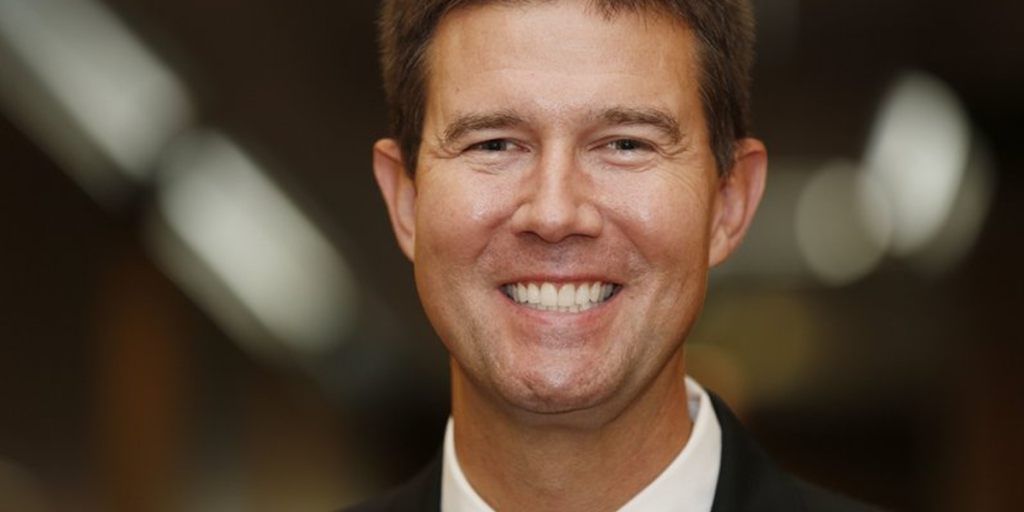
Recently, the implementation of the newly drawn state legislative district lines has become a point of conversation in large part due to a lack of required performance by a very small number of county registrars in four Alabama counties. I want every Alabamian to know that while these mistakes were human errors, and everyone makes mistakes, I do not, have not, and will not ever accept human error as a sufficient excuse for poor performance and the lack of accomplishment of an assigned task. It is appropriate to let the people in our state know that in 2017, I formed a task force that studied the position and requirements of serving as a registrar in Alabama. This task force consisted of all stakeholders who work with the registrars, including, but not limited to, registrars, probate judges, circuit clerks, legislators, and sheriffs, as well as community interest groups from around the state. Over a period of six months, this task force developed comprehensive legislation to evaluate, assess, and implement changes to the responsibility of the position of registrar in Alabama. I asked State Senator Jimmy Holley and State Representative Alan Baker to sponsor this legislation, which would have dramatically changed the registrar appointment process and increased transparency and accountability from the people who hold the position throughout the state. Senate Bill 137 would have allowed the Secretary of State to provide an updated job description with more stringent minimum qualifications, demographic and county population considerations, required registrar trainings and assessments on an annual basis, clarified that the registrars serve at the pleasure of their appointing authority, and prevented registrars from reappointment if removed for cause, as well as several other significant measures. Unfortunately, there were several people, including members of the task force, as well as individuals who were opposed to the changes, who voiced their personal concerns to the members of the legislature. This resulted in the failure of this comprehensive piece of legislation. To be clear, the Secretary of State’s Office has no direct involvement in legislative reapportionment. According to the Constitutions of the United States and Alabama, that responsibility lies with the members of the Alabama Legislature. Our office facilitates the process by ensuring that the registrars receive the new district maps, which are prepared by the Alabama Legislature and provided to us by the Office of Legislative Reapportionment, in a timely manner. In November of 2021, we distributed maps to the County Boards of Registrars to ensure they had this important information as soon as possible to begin their important work. Currently, many counties are using paper maps to redraw district lines, which can often lead to human error when redrawing district boundaries. We anticipated that some counties might have difficulty assigning the new district lines, so beginning in late 2021, the Secretary of State’s Office made Geographic Information System (GIS) technology available to each county not currently using such mapping technology to reassign individuals who had been relocated based on legislative and congressional reapportionment. The use of GIS technology enables registrars to more accurately implement the new district maps approved by the Alabama Legislature. The Secretary of State’s Office offered to cover the licensing costs for the counties to use GIS. Unfortunately, no county accepted our offer to provide GIS, with many counties citing recurring financial obligations and initial workload concerns. It is our recommendation that the Alabama Legislature reexamine the current Board of Registrar system, as well as consider providing funding to ensure that boundary lines are drawn appropriately, even if that means engaging outside vendors. This would not be an unduly burdensome expense because reapportionment occurs only once a decade. With that being said, those registrars who have proven themselves unable to adequately perform their duties must face consequences. In the county where the most egregious dereliction of duties occurred, I sought and received the resignation of all three registrars involved. We have the power to correct this and future issues but only with the collaboration of the Alabama Legislature, county officials, and the Secretary of State’s Office. John Merrill has been the Secretary of State for Alabama since 2015.
Kay Ivey signs Numeracy Act into Law, eliminating Common Core standards completely

Governor Kay Ivey on Tuesday signed Senate Bill 171, the Alabama Numeracy Act, into law. The Numeracy Act, sponsored by Sen. Arthur Orr and Rep. Alan Baker, is a strategic approach to improving mathematics achievement. In a press release, Ivey stated, “Literacy and numeracy are the blocking and tackling of education, plain and simple. For our students to have positive educational outcomes and to have success later in life, we must ensure proficiency in both reading and math is achieved. That is why, here in Alabama, we are focusing on what matters, and that is core instruction – not any of the other nonsense. Alabama parents wholeheartedly agree with that.” In 2019, Gov. Ivey and the State Board of Education eliminated Common Core from Alabama’s mathematics standards, and with the governor’s signature, this legislation eradicates these standards once and for all. “We cannot accept passing our students along without the proper foundation as the status quo, and that is why I have proudly signed the Alabama Numeracy Act into law. This strategic, targeted, and wise investment in our children will provide necessary resources, will include high-quality instruction, and will keep our schools accountable. The Alabama Numeracy Act delivers on my commitment to place the same sense of urgency on math as we rightfully have on reading,” Ivey continued. “Students will not only understand how to find an answer, but will have the mathematical reasoning needed for the in-demand STEM jobs in Alabama,” Ivey concluded.
Steve Flowers: Incumbency prevails in 2022 State House races

Folks, believe it or not, we are closing in on six months before next year’s election year. The primary election is set for May 24, 2022. In Alabama, all our major constitutional officers are on the ballot next year. The governor’s office is the premier race in the state, and that coveted and powerful post is set for its four-year quadrennial run. Therefore, this big political year is referred to as the gubernatorial year. Those of us who follow Alabama politics have been salivating with anticipation for a cavalcade of great races. However, the power of incumbency has devasted the big year into a yawn. All the major state offices are held by popular incumbents, who are either running unopposed or have minimal opposition. The consolation prize was that there would be the legislative races. After all, this is where the real power in the state rests. You can simply look at where the special interest and PAC money is spent to verify that fact. However, the omnipotent power of incumbency has also encroached on those races. The Alabama House of Representatives has 105 members. There are 77 Republicans and 28 Democrats. The large majority of incumbents are running for reelection – both Republicans and Democrats. The overwhelming majority of these incumbents will have no opposition. However, in the House, there will be some major changes in leadership because of retirement or moving on to new posts. Speaker of the House Mac McCutcheon is not running for reelection. This has created an interesting and spirited race within the Republican Caucus ranks for Speaker. In addition, Victor Gaston of Mobile, who is Speaker Pro Tem, is also retiring. Bill Poole of Tuscaloosa, who chaired the powerful House Ways and Means Education Budget Committee, has left the House to be the State Finance Director. House Rules Committee Chairman Mike Jones of Andalusia is running for the open Senate seat of retiring Senator Jimmy Holley. Two of the freshman House members are running for statewide office. Wes Allen of Troy is running for Secretary of State, and Andrew Sorrell of Tuscumbia is running for State Auditor. In addition, Connie Rowe of Jasper is leaving the House to become an administrative assistant to Lt. Gov. Will Ainsworth. Some of the veteran House members who are choosing to hang up their legislative cleats include Howard Sanderford of Huntsville, Mike Ball of Huntsville, K.L. Brown of Jacksonville, Kerry Rich of Marshall, Allen Farley of Jefferson, Harry Shiver of Baldwin, Mike Holmes of Elmore, and Becky Nordgren of Etowah. The most noteworthy retiree may be Representative Steve McMillan of Baldwin County, who is retiring after serving close to 43 years in the House. Steve has been a quiet yet very effective voice for the people of Baldwin County. They all will be missed. Some of the high profile and powerful members of the House, who will return for another four years with no or token opposition, are Steve Clouse of Ozark, Nathaniel Ledbetter of Dekalb County, and Danny Garrett, Jim Carns, David Wheeler, and David Faulkner of Jefferson. Danny Garrett has ascended to Chairman of the House Ways and Means Education. Other leaders returning are Chris Pringle, Reed Ingram, Randall Shedd, Tracy Estes, Chris Sells, David Standridge, Ginny Shaver, Jim Hill, Alan Baker, Joe Lovvorn, Chris Blackshear, Kyle South, Paul Lee, Jeff Sorrells, Rhett Marques, Steve Hurst, Joe Faust, and Margie Wilcox. The Democratic leadership will remain intact. There is an illustrious array of House Democratic leaders, including Anthony Daniels, Chris England, Laura Hall, Peb Warren, Barbara Boyd, A.J. McCampbell, Berry Forte, Dexter Grimsley, Thomas Jackson, Kevin Lawrence, Mary Moore, Juandalynn Givan, and veteran John Rogers. Two of the Democratic House veterans from Jefferson County, Louise Alexander and Merika Coleman, are both running for an open Jefferson County Senate Seat, leaving both their House seats up for grabs. There may be an increase in the number of females in the House of Representatives. It has already begun with the election of Cynthia Almond of Tuscaloosa, who was elected without opposition to replace Bill Poole. In addition, Patrice Penni McClammy won the Montgomery District 76 seat of her late father, Thad McClammy. She won with no opposition. See you next week. Steve Flowers is Alabama’s leading political columnist. His weekly column appears in over 60 Alabama papers. He served 16 years in the state legislature. Steve may be reached at www.steveflowers.us.
Alabama House okays proposed teacher retirement change

The bill would reverse some of the changes lawmakers implemented in 2013.
House Committee gives thumbs up to bills on license restrictions, renewals

The Alabama House Committee on Public Safety and Homeland Security met Wednesday morning to discuss several bills and, in a move uncommon in most committee meetings, debate was minimal and support widespread. The first agenda item was HB 94, a bill sponsored by Rep. Alan Baker (R-Brewton) to provide disabled veterans with discounts on license plates, even if that license plate is not a disabled veterans plate. The inspiration for Baker’s bill came from an email he received from a disabled veteran who was afraid of being targeted due to his disabled veteran plate – targeted by terrorists for being a vet and targeted by criminals for being disabled – who urged his representative to make it possible for vets to receive subsidies for all license plates. The only form of dissent from the bill came from Rep. Mary Moore (D-Birmingham) who noted that she has felt targeted every day of her life, recalling times when she had a shotgun pointed at her head and times she was beaten by a white man for using the wrong water fountain. “Whether it’s real or perceived, I would want them to feel safe and secure,” Baker said before a vote was taken and the bill given a favorable report. A bill from Rep. Elaine Beech (D-Chatom), HB 1, would allow law enforcement officers to issue traffic citations at the scene of an accident. Current law provides that if a person is transported to the hospital, an officer can not follow them there to issue an arrest. Beech’s bill would change that. Rep. Chris England (D-Tuscaloosa) opposed the measure on mostly technical grounds, noting that clarity needed to be made in certain language used in the bill, specifically in relation to how officers would determine who was at fault in an accident and how long they had to press charges against an offender. The committee voted to carry the bill over until next week’s meeting. HB 11, which would allow Alabamians to renew their driver’s licenses up to six months before the expiration date, received a green light from the committee, as well as HB 22 from Rep. Mike Holmes (R-Wetumpka) to strengthen penalties for youthful drivers and their parents if a violation of the graduated driver’s license regulations is committed. Holmes brought the bill last year in response to the death of three Wetumpka High School teens and a deputy in an auto collision. Under the graduated driver’s license regulations, the teens should not have been allowed to be in a car together. Multiple committee members, both Republican and Democrat, applauded Holmes for bringing the bill forward sand making efforts to “protect our young people.”
Local control plays big role in virtual schools bill’s success

Later this week, Gov. Robert Bentley is expected to sign Senate Bill 72 into law, making Alabama the 30th state with a comprehensive policy for full-time online education schools for high school students. Sen. Dick Brewbaker, who sponsored the legislation, has called the bill “groundbreaking,” highlighting its potential to expand choices for quality education for Alabama students. For some advocates, the agreement on virtual schools came as a surprise after an extended debate over school choice in the state. Duncan Kirkwood, Alabama state director for the Black Alliance for Educational Options, said keeping virtual schools as part of the public school system is one important reason for its popularity among legislators. A key feature of the bill is that students enrolled in the virtual school would be considered public school students, subject to the same testing and graduation requirements as their peers. However, local school boards are able to design or contract virtual school options that meet the needs of its students. The potential, Kirkwood said, is that students who excel in certain subjects will be able to attend college-level classes online and no longer be limited by what their local high school can provide. “This is transformational. In just a few years, we’ve gone Alabama being a place where your zip code determines the education you get to one where parents can choose the right options for their kids – without the burden of private school funding.” During Thursday’s House vote, Rep. Alan Baker applauded the bill’s reliance on local judgment and management of options for students. “I think that technology is rapidly changing how we deliver education. Students sometimes don’t ‘plug in’ to traditional education,” Baker said. “I love the local option so school boards can determine the best delivery method for their students.” If Bentley signs the virtual schools proposal, high school students statewide would be able to attend online classes as early as the 2016-2017 school year.

